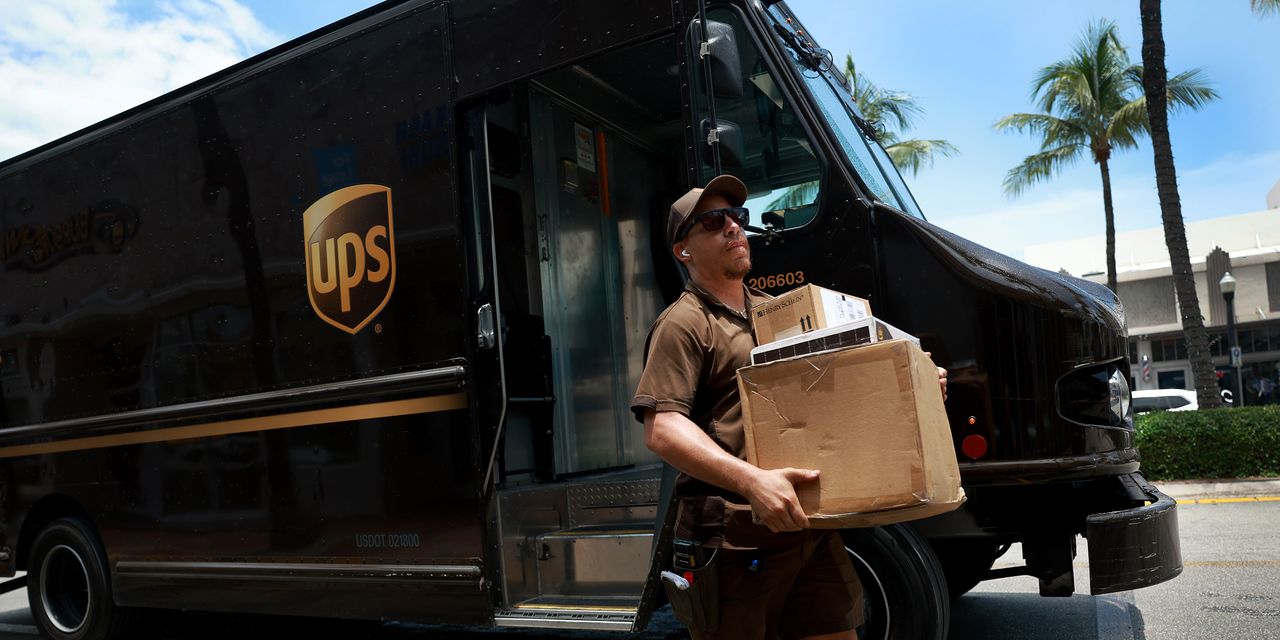If there is a UPS strike next month, Brooklyn-based driver Matt Leichenger is prepared for it: He has savings, he said, and can get by for a couple of weeks without his regular paycheck if needed.
Leichenger, a 27-year-old shop steward for Teamsters Local 804, said that about a year ago, his local encouraged him and his colleagues to save up in case there was a strike, so they started personal strike funds at the local’s credit union.
Many of the colleagues he has talked with also feel ready to strike, even in a place like New York City with its high cost of living, he said.
“A few months ago, some of them were worried,” Leichenger said. But now, “the vibe in my building is very much like we’re more united than we’ve ever been.”
If their employment contract expires July 31 with no agreement, more than 340,000 UPS
UPS,
delivery drivers and warehouse workers could walk off their jobs Aug. 1, the International Brotherhood of Teamsters has said. Though Leichenger said he and most of his colleagues are prepared for the possible personal financial ramifications of a strike that they really don’t want, other UPS workers on online forums such as Reddit and Facebook have said they’re worried about running out of money.
The Teamsters have a strike fund with well over $300 million in it, said Kara Deniz, a spokesperson for the union. A worker’s weekly strike benefit is equal to five times their monthly dues, according to the Teamsters website.
For regular full-time drivers, that would be $520 a week. The top rate for package-delivery drivers who have worked for the company for at least four years is $42 an hour, said UPS spokesperson Mitch Polikoff, adding that drivers work an average of nine hours a day and 46-hour weeks including overtime. Polikoff also said 59,000 of full-time union employees have been with UPS for more than five years.
Part-time workers make an average of $20 an hour after 30 days, and average about 20 hours a week, Polikoff added. Part-time workers who make $20 an hour and pay $50 a month in dues would be eligible for strike benefits of $250 a week, about half of what one part-timer who spoke with MarketWatch would make in a week. And part-time workers who make $16 or less would receive $200 a week.
“‘We’re Teamsters. We have to stick together.’”
As for other possible sources of financial help for striking workers, “there’s also some local unions that have strike funds,” Deniz said, as well as “a ton of support from other unions.” In some cases in certain states, she added, workers may be able to draw from unemployment insurance.
Leichenger’s local is also “organizing as much community support as we can,” such as lining up pizza for the picket lines, he said.
Asked to comment for this story, Polikoff told MarketWatch on Friday: “UPS supports our employees’ right to express their views.”
“We agree on the vast majority of the issues the union and our people have raised,” Polikoff said. “We look forward to returning to the negotiating table next week to come to an agreement by Aug. 1 that represents a win for our customers, our employees, the union and the company.”
UPS and the Teamsters are scheduled to resume contract negotiations Wednesday for the first time since talks broke down July 5.
What Teamsters workers want from UPS
Noah Jorstad, a 25-year-old part-time warehouse worker in Fargo, N.D., thinks that if there is a strike, it won’t last very long. That’s not what worries him most: He wants negotiations to yield raises for part-timers like himself, he said, as well as the creation of more full-time jobs.
“There’s more than enough work for somebody to get eight hours a day,” said Jorstad, who has a toddler son and receives health benefits through UPS for working there about 27 hours a week. “It would be better for me if I could have just one full-time job.” He added that the company seems to prefer using part-timers and having them work overtime instead of just creating more full-time jobs.
Jaime Salazar, a full-time driver for more than 10 years in Napa, Calif., spent more than seven years as a part-time warehouse worker. He said he doesn’t want to strike, but “if we have to, I will stand up for my part-time coworkers,” whom he said do “back-breaking work.”
“We’re Teamsters,” he added. “We have to stick together.”
The union is asking for a new five-year contract that includes higher wages — especially for part-timers, who comprise half of the UPS hourly workforce — and improvements in working conditions.
Jorstad said he also worries about how his workplace might be affected by those who cross the picket line, because he has heard some of his colleagues talking about possibly doing so.
“I’m already asking myself: How am I going to treat these guys after the strike?” Jorstad said.
‘I would prefer not to strike’
Thomas Berry, a California-based former UPS driver who retired a few years ago after 30 years with the company, was around for the last strike in 1997, which lasted 15 days.
“When we went on strike, it basically shut America down,” he said. “It was a disaster” for the company and others who relied on it, and UPS lost loyal customers, he said.
The 1997 strike ended with a huge victory for the Teamsters and UPS workers, securing raises for part-timers and getting the company to convert 10,000 part-time positions into full-time positions. It was a blow to UPS, which bet that the union would be divided and that the public would turn on the Teamsters. In fact, polling showed a majority of the public was on the side of the striking workers. The company reportedly lost more than $600 million in business.
Because of that, Berry thinks the company is simply “waiting till the 11th hour to cut a deal” this time around. There is so much more demand for deliveries now, he said: “Everything is delivered. You see these guys at 9 and 10 at night delivering. One Christmas, we were out there at midnight.”
Berry said at the time that he walked off the job, he was “in his 20s and broke,” and the strike fund only provided $50 a week. “I was definitely relieved when it was over,” he said.
Salazar and Jorstad both had heard about the possibility of a strike as well, so they, too, have set aside some money.
Jorstad also said he has another part-time job that he hopes could give him more hours if he needs them, and mentioned possibly doing deliveries for DoorDash
DASH,
if necessary.
“I would prefer not to strike,” Jorstad said. “But I feel ready.”
Read the full article here










